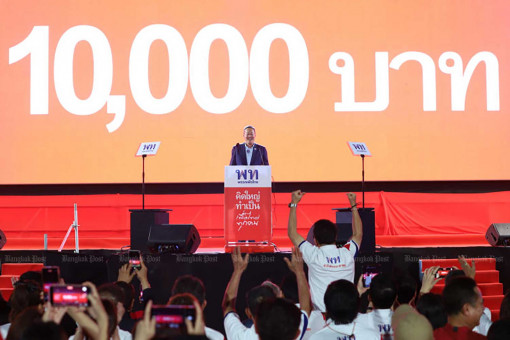
Prime Minister Srettha Thavisin on Wednesday insisted the Pheu Thai-led government will press ahead with the party’s 10,000 baht digital handout policy immediately after his cabinet is royally endorsed.
The pledge came after he was royally appointed as the country’s 30th prime minister.
“This is our main policy. We will go ahead with it after the cabinet is royally endorsed,” he said.
He said he did not see any apps stating Pheu Thai will scrap the policy going viral on the internet. Such apps have created confusion about the policy.
Many have cast doubt over the possibility of the new government implementing the Pheu Thai Party’s 10,000-baht digital money handout policy, as well as other key policies promised in the run-up to the May 14 election.
The digital currency giveaway could cost up to 560 billion baht, which would be diverted from an unspecified wing of the government, the Budget Bureau said on Wednesday.
As soon as the new government takes office, the bureau will issue a report detailing the fiscal situation of the country and call for more discussions with other relevant agencies, said bureau director Chalermphol Pensoot.
The bureau alone cannot presently give any assurances as the implementation of the flagship policy, he said. “Now the bureau is waiting to hear from the new government, but it is committed to supporting this policy as much as it can,” he said.
The report will give a clear picture of how much money the government has in hand and what it could do with it, he said. More reports are expected to follow.
The budget planning for the 2024 fiscal year will need to be adjusted, and budgets earmarked for certain projects which are now considered less urgent in the new government’s view will possibly have to be diverted to fund the digital money handout project, he said.
Even though the digital money handout has the potential to help stimulate the economy almost instantly, the implementation is likely to face intense scrutiny under 2018 legislation on financial and fiscal discipline, said Assoc Prof Thitiwut Boonyawongwiwat, Faculty of Political Science and Public Administration, Chiang Mai University.
“And if found guilty of spending the state budget for the wrong purpose under this law, the new prime minister and his government might end up losing their stability,” said Assoc Prof Thitiwut.
As for the minimum 600-baht daily wage and 25,000-baht starting monthly salary policies, the government couldn’t push to implement them without support from the private sector.

